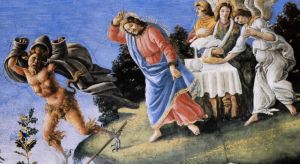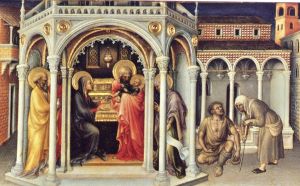
don Giuseppe Nespeca
Giuseppe Nespeca è architetto e sacerdote. Cultore della Sacra scrittura è autore della raccolta "Due Fuochi due Vie - Religione e Fede, Vangeli e Tao"; coautore del libro "Dialogo e Solstizio".
Against the tide Transfiguration: Faith and Metamorphosis
RELIGIOUS SENSE AND PSYCHE (by Francesco Giovannozzi, psychologist and psychotherapist)
Reflections on the religious sense.
This reflection also stems from a dialogue with a gentleman of about my age.
This well known and respected gentleman in his village met an old acquaintance of his and was rebuked by the latter because he did not attend religious services; according to her, he should have done so for his own good. The gentleman replied that he did not feel this need and that it did not seem to him that his behaviour might offend the generally understood religious sense.
Discussions like this occur often among human beings, this is nothing new. I report it because it made me reflect on the religious sense in human life. The topic touches on several disciplines and is complex.
Studies by Fiorenzo Facchini say that various behaviours of prehistoric man are read in a religious sense. Our ancestors gave burials to their dead and painted representations on the walls.
These caves had something sacred about them. Religious manifestations of antiquity were songs and dances.
In all religions we find a need for reassurance about our lives and also the need to find magical answers to our problems.
Bettelheim argues that on an individual level and especially in childhood, religion can provide that basis of stability and security with which the child can evolve towards autonomy.
The society in which we live forces us to run, to be in step with the times; it wants to give us its values.
Today there is the fashion of the ephemeral, of competitiveness - and so it is psychologically reassuring to believe in a 'mother-environment' that loves us, or to be within a design that gives meaning to our lives.
Unlike Freud who did not have a positive view, or the philosopher Charles Marx who claimed that religion is the opium of the people, Jung in the eleventh volume "Psychology and Religion" says verbatim:
"Since' religion is indisputably one of the first and universal expressions of the human soul [...] it is not only a sociological or historical phenomenon, but an important personal matter" (vol.XI, p.15).
In my long professional practice I have often encountered people who have had to come to terms with this issue.
The therapist's task is not to condition the other, but to clarify the underlying dynamics.
I have met people who described themselves as non-believers but who on an unconscious level had to come to terms with their dreams. Or individuals who belonged to different religions that were so rigid that they inhibited their vital sense.
In all these cases, knowledge of the human soul grew, whether they claimed to be religious or not. We are not discussing each person's philosophical position.
There were differences between the person who called himself religious and one who was not.
I would like to point out that these differences do not constitute value judgements, but only behavioural characteristics.
The religious person believes that there is a reality that is sacred and beyond this world - and that his existence is enhanced according to his belief.
He who called himself a non-believer rejected transcendence, was one who is self-made and believes that he alone constructs his own destiny.
A constant concern was to deny any reference or wisecrack that was made to religious topics.
I have even met someone who was more concerned about what my beliefs were than his personal problems. I always replied that my sphere of action was the psyche in all its manifestations. Beyond any manifestation sacred or not, respect for the person is already a sacred attitude.
"To 'desacralise' oneself completely is not easy either, as it is difficult to deny history altogether - both for those who believe in creation and those who believe in evolution.
Who knows whether evolution includes a creation?
Dr Francesco Giovannozzi Psychologist-psychotherapist
Loving enemies and turning the other cheek: whyever?
Wedding at Cana: between water and wine... desolation or love
The Kingdom of God grows here on earth, in the history of humanity, by virtue of an initial sowing, that is, of a foundation, which comes from God, and of a mysterious work of God himself, which continues to cultivate the Church down the centuries. The scythe of sacrifice is also present in God's action with regard to the Kingdom: the development of the Kingdom cannot be achieved without suffering (John Paul II)
Il Regno di Dio cresce qui sulla terra, nella storia dell’umanità, in virtù di una semina iniziale, cioè di una fondazione, che viene da Dio, e di un misterioso operare di Dio stesso, che continua a coltivare la Chiesa lungo i secoli. Nell’azione di Dio in ordine al Regno è presente anche la falce del sacrificio: lo sviluppo del Regno non si realizza senza sofferenza (Giovanni Paolo II)
For those who first heard Jesus, as for us, the symbol of light evokes the desire for truth and the thirst for the fullness of knowledge which are imprinted deep within every human being. When the light fades or vanishes altogether, we no longer see things as they really are. In the heart of the night we can feel frightened and insecure, and we impatiently await the coming of the light of dawn. Dear young people, it is up to you to be the watchmen of the morning (cf. Is 21:11-12) who announce the coming of the sun who is the Risen Christ! (John Paul II)
Per quanti da principio ascoltarono Gesù, come anche per noi, il simbolo della luce evoca il desiderio di verità e la sete di giungere alla pienezza della conoscenza, impressi nell'intimo di ogni essere umano. Quando la luce va scemando o scompare del tutto, non si riesce più a distinguere la realtà circostante. Nel cuore della notte ci si può sentire intimoriti ed insicuri, e si attende allora con impazienza l'arrivo della luce dell'aurora. Cari giovani, tocca a voi essere le sentinelle del mattino (cfr Is 21, 11-12) che annunciano l'avvento del sole che è Cristo risorto! (Giovanni Paolo II)
Christ compares himself to the sower and explains that the seed is the word (cf. Mk 4: 14); those who hear it, accept it and bear fruit (cf. Mk 4: 20) take part in the Kingdom of God, that is, they live under his lordship. They remain in the world, but are no longer of the world. They bear within them a seed of eternity a principle of transformation [Pope Benedict]
Cristo si paragona al seminatore e spiega che il seme è la Parola (cfr Mc 4,14): coloro che l’ascoltano, l’accolgono e portano frutto (cfr Mc 4,20) fanno parte del Regno di Dio, cioè vivono sotto la sua signoria; rimangono nel mondo, ma non sono più del mondo; portano in sé un germe di eternità, un principio di trasformazione [Papa Benedetto]
In one of his most celebrated sermons, Saint Bernard of Clairvaux “recreates”, as it were, the scene where God and humanity wait for Mary to say “yes”. Turning to her he begs: “[…] Arise, run, open up! Arise with faith, run with your devotion, open up with your consent!” [Pope Benedict]
San Bernardo di Chiaravalle, in uno dei suoi Sermoni più celebri, quasi «rappresenta» l’attesa da parte di Dio e dell’umanità del «sì» di Maria, rivolgendosi a lei con una supplica: «[…] Alzati, corri, apri! Alzati con la fede, affrettati con la tua offerta, apri con la tua adesione!» [Papa Benedetto]
«The "blasphemy" [in question] does not really consist in offending the Holy Spirit with words; it consists, instead, in the refusal to accept the salvation that God offers to man through the Holy Spirit, and which works by virtue of the sacrifice of the cross [It] does not allow man to get out of his self-imprisonment and to open himself to the divine sources of purification» (John Paul II, General Audience July 25, 1990)
duevie.art
don Giuseppe Nespeca
Tel. 333-1329741
Disclaimer
Questo blog non rappresenta una testata giornalistica in quanto viene aggiornato senza alcuna periodicità. Non può pertanto considerarsi un prodotto editoriale ai sensi della legge N°62 del 07/03/2001.
Le immagini sono tratte da internet, ma se il loro uso violasse diritti d'autore, lo si comunichi all'autore del blog che provvederà alla loro pronta rimozione.
L'autore dichiara di non essere responsabile dei commenti lasciati nei post. Eventuali commenti dei lettori, lesivi dell'immagine o dell'onorabilità di persone terze, il cui contenuto fosse ritenuto non idoneo alla pubblicazione verranno insindacabilmente rimossi.



















